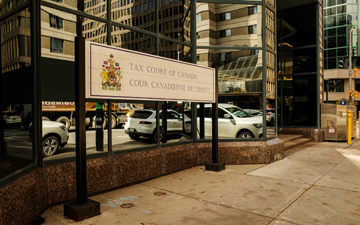When the CRA reassessed a taxpayer's tax returns beyond the normal reassessment period

Canadian accountant and tax lawyer David J. Rotfleisch explains how, in Goldhar v The King, a toy salesman successfully appealed a CRA reassessment
 |
David J Rotfleisch, CPA, JD is the founding tax lawyer of Taxpage.com and Rotfleisch & Samulovitch P.C., a Toronto-based boutique tax law corporate law firm. |
Editor's note: The following case was initiated by the Canada Revenue Agency in response to the findings of the International Consortium of Investigative Journalists, which published the Panama Papers, Pandora Papers and Offshore Leaks. For more background to the story, read Toy salesman beats CRA in tax court appeal after being reassessed for $1.2 million.
Introduction
In Goldhar v The King, the Canada Revenue Agency (CRA) reassessed Mr. David Goldhar's 2008 to 2011 tax returns beyond the normal reassessment period (three years from the date the CRA sent the original notice of assessment) by including unreported shareholder benefits and imposing gross negligence and foreign reporting penalties. The taxpayer, Mr. Goldhar, is an international businessman who utilized complex corporate structures with his business colleagues for the business they carried on, which included corporations and partnerships in Canada, the British Virgin Islands and Hong Kong.
The CRA initially audited the taxpayer's 2006 to 2013 taxation years, then issued the reassessments after the tax will audit was completed. The taxpayer objected to the reassessments and eventually appealed to the Tax Court of Canada. The Tax Court judge allowed the taxpayer's appeal on the basis that one, the CRA didn't meet the onus to prove that the taxpayer made misrepresentations that were attributable to neglect, carelessness or wilful default; and two, the taxpayer was diligent in his attempt to address his foreign tax reporting obligations.
The taxpayer raised three issues in the appeal
The taxpayer raised the following issues in the notice of appeal:
- Whether the 2008 to 2011 reassessments were statute-barred;
- Whether the amounts in the reassessment represented income in his hands; and
- Whether the CRA correctly applied gross negligence penalties for the 2008 to 2011 taxation years.
The Tax Court found the CRA incorrectly computed the taxpayer's shareholder benefits
Under subparagraph 152(4)(a)(i) of the Income Tax Act, the Minister may at any time make an assessment, reassessment or additional assessment of tax for a taxation year if the taxpayer or person filing the return has made any misrepresentation that is attributable to neglect, carelessness or wilful default or has committed any fraud in filing the return or in supplying any information under this Act.
Although the Tax Court found inconsistency in the witness's testimonies and evidence, it concluded on a balance of probability that the CRA did not meet the onus regarding some of the alleged shareholder benefit amounts. The Tax Court then referred to the decision in Venne v. R., [1984] C.T.C. 223 that for the CRA to invoke the power under subparagraph 152(4)(a)(i) of the Income Tax Act, a taxpayer must be negligent, which is established if it is shown that the taxpayer has not exercised reasonable care. In the case at bar, the Tax Court found Mr. Goldhar relied upon professional accountants to file his corporate and personal tax returns and lawyers and accountants to structure his legal affairs. Therefore, Mr. Goldhar exercised reasonable care in his tax reporting for the 2008 to 2011 taxation years.
The Tax Court found gross negligence penalties should not apply to the taxpayer
The tax court cited the seminal case on gross negligence penalties, Venne v. The Queen, that gross negligence must be taken to involve greater neglect than simply a failure to use reasonable care. It must involve a high degree of negligence tantamount to intentional acting, an indifference as to whether the law is complied or not. In the court's view, the CRA has not established that the taxpayer failed to report a significant portion of the alleged unreported income in the taxation years under appeal. The evidence presented to the court indicated that the taxpayer with the assistance of his wife made every attempt to ensure that his tax returns were filed properly and accurately for each of the taxation years under appeal.
The Tax Court found the taxpayer was diligent in his foreign reporting obligations
Regarding the penalties imposed by the CRA that the taxpayer failed to comply with his foreign reporting obligations and further foreign-based information under s.162(7) and 162(10.1) of the Income Tax Act, the tax court found these two penalties were subject to a due diligence defence. The court referred to the decision in Chiang v R, 2017 TCC 165 that a defendant can also avoid liability by showing that he or she took all reasonable steps to avoid the particular event. The defence of due diligence is based on an objective standard: it requires consideration of what a reasonable person would have done in similar circumstances.
The Tax Court found Mr. Goldhar took all reasonable steps and was not negligent in filing his tax returns. With the assistance of his wife, he provided all requested information to his accountants every year and made reasonable efforts to ensure that his tax returns were filed accurately.
In this case, the taxpayer was successful in his appeal because he relied on accountants and Canadian tax lawyers to file his tax returns and structure his corporate tax planning. Due to the fact that he relied on Canadian tax experts, Mr. Goldhar was found to be diligent in his tax affairs and not liable for gross negligence penalties.
David J Rotfleisch, CPA, JD is the founding tax lawyer of Taxpage.com and Rotfleisch & Samulovitch P.C., a Toronto-based boutique tax law corporate law firm and is a Certified Specialist in Taxation Law who has completed the CICA in-depth tax planning course. He appears regularly in print, radio and TV and blogs extensively.
With over 30 years of experience as both a lawyer and chartered professional accountant, he has helped start-up businesses, cryptocurrency traders, resident and non-resident business owners and corporations with their tax planning, with will and estate planning, voluntary disclosures and tax dispute resolution including tax audit representation and tax litigation. Visit www.Taxpage.com and email David at david@taxpage.com.
Read the original article with links. Title image: iStock. Author photo courtesy Rotfleisch & Samulovitch P.C.







(0) Comments